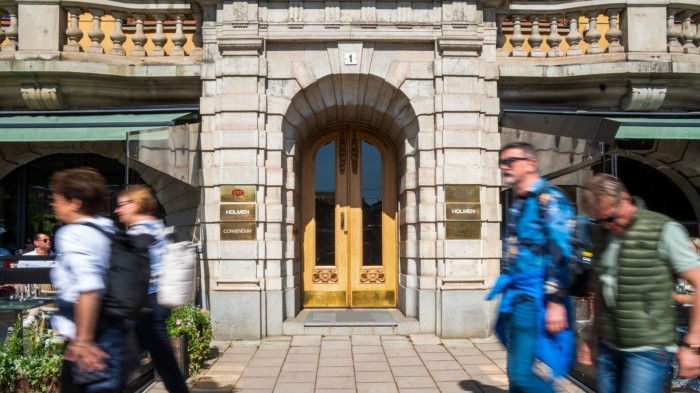Hedge fund short sellers suffer $43bn of losses in market rally

Simply sign up to the Hedge funds myFT Digest -- delivered directly to your inbox.
Hedge funds betting on a decline in US and European stock markets have suffered an estimated $43bn of losses in a sharp rally over recent days.
Short sellers, many of whom had built up bets against companies exposed to higher borrowing costs over the past year or so, have been caught out by a “painful” rebound in “low quality” stocks this month, said Barclays’ head of European equity strategy Emmanuel Cau. That has come as the market has grown more confident that the US Federal Reserve’s cycle of rate rises is finally over.
The rally, which has left Wall Street’s S&P 500 index on track for its strongest month since July last year, was sparked by US Federal Reserve chair Jay Powell’s recent perceived reluctance to tighten monetary policy any further when he left rates on hold at the start of the month.
Weaker than expected US consumer price inflation data released on Tuesday last week then gave stocks a further boost, with the S&P 500 and the tech-heavy Nasdaq Composite indices both enjoying their best days since April.
Analysts said the upswing triggered a brutal “short squeeze” in which some hedge funds repurchased stocks to cover their negative bets, which helped push share prices even higher.
“It’s been a very tricky market this year but this short squeeze is really killing year end performance for a lot of funds,” said Cau. “No one was able to monetise the rally in garbage stocks.”
The past month’s “easing of financial conditions may have caused some dead cats to bounce”, said Barry Norris, chief investment officer at Argonaut Capital, referring to the rebound in lower quality stocks.
Funds suffered $43.2bn of losses on short bets in the US and Europe from Tuesday to Friday inclusive last week, according to calculations by data group S3 Partners, which do not take account of gains that funds may have made in other stocks they own.
Bets against technology, healthcare and consumer discretionary stocks were among the most costly for hedge funds, S3’s data shows. A 14 per cent rise in the week to Monday in the share price of cruise line Carnival Corp, for instance, cost hedge fund short sellers a total of $240mn.
Indices tracking heavily-shorted stocks have rebounded sharply from recent lows as market sentiment has rapidly improved. Goldman Sachs’ Very Important Short Position index, which tracks the 50 constituents of the S&P 500 with the highest total dollar value of short interest outstanding, is on track for its best month since October last year.
Barclays’ most shorted stocks in Europe basket has climbed 9.9 per cent over the past three weeks, leaving it on track for its biggest monthly gain in at least 10 years, Bloomberg data showed.
Heavily shorted Swedish real estate company Samhällsbyggnadsbolaget (SBB) is among the groups to have hurt hedge funds in recent days. While its shares have collapsed by around three-quarters this year, yielding big gains for short sellers, it rebounded by a third in the week to Monday. That hit funds including Samlyn Capital, Balyasny and Arrowstreet Capital, according to regulatory disclosures and analysis by data group Breakout Point.
Meanwhile, Castellum, whose shares are shorted by Two Creeks Capital Arrowstreet and Fosse Capital, has jumped 16 per cent this month.
Last Tuesday, when the US inflation data was published, was a “squeeze day,” said Brian Heavey, an equity trader at JPMorgan, who wrote in a note that macro hedge funds had been “massively short” consumer goods groups due to their vulnerability to higher rates. As a result, the sector has registered “massive gains” during November’s index-wide rally, Heavey added.
Other rate-sensitive sectors reacted just as strongly. Shares in US green energy companies Fuelcell Energy and Sunrun — which have tumbled this year and remain heavily shorted — on Tuesday surged by around a fifth.

The rapid reversal in markets has proved particularly tough for trend-following hedge funds known as commodity trading advisers, which use algorithms and strict risk management metrics to exploit market patterns in global futures markets.
Many have suffered as markets have changed direction and begun to price in extra rate cuts next year.
“You get inflation kind of collapsing . . . and all those shorts in these companies that are really susceptible to higher rates get this booming relief rally,” said Charlie McElligott, a cross-asset strategist at Nomura.
CTAs are down 3.7 per cent on average this month, according to data group HFR, leaving them down 2.6 per cent this year. A model portfolio run by Société Générale, which aims to replicate the positions typically taken by computer-driven trend-followers, is showing losses in all asset classes this month.
However, Barclays’ models suggest that even now CTAs remain net short both equities and bonds. “So [interest] rates down and equities up remains a pain trade,” said Cau.
“I’m surprised that people weren’t as dynamic in reversing some of their ‘higher for longer’ trade,” McElligott said. Hedge funds have missed out on November’s stock market gains in “brutal fashion”, he added.
Comments